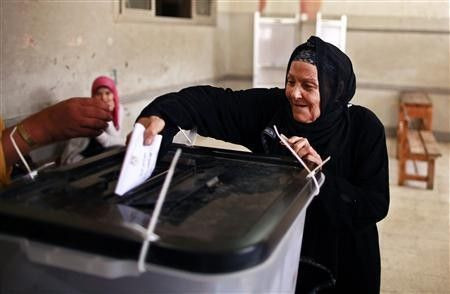New Election, Old Tricks For Egypt's Muslim Brotherhood

On Thursday, millions of Egyptians took to the voting booths for the second day for the country's first presidential elections since the fall of Hosni Mubarak -- and there at the polling stations to help them was the Muslim Brotherhood.
While the election is still very much up for grabs and the lead continually changing among the race's 13 candidates, the Brotherhood is hoping that last-minute barnstorming will push its candidate, Mohammed Mursi, into the lead.
According to reports from AllAfrica and Egypt's Ahram Online, the Muslim Brotherhood sent representatives with laptops to help voters find their electoral registration numbers, sometimes while mentioning Mursi's name. In other districts, the electioneering was more deliberate, and volunteers hung posters and encouraged passersby to vote their way.
Technically, what the Brotherhood is doing is illegal. Parties are not allowed to campaign within 250 meters of polling stations, and seven supporters of Mursi and former Muslim Brotherhood leader Abdel Moneim Aboul Fotouh were arrested in Behira on Wednesday.
But, what the Brotherhood is doing is also a politically savvy move.
With most candidates running either as independents or as representatives of new, small parties, such as Abul-Ezz El-Hariri and his Socialist Popular Alliance Party, Egyptians who have been less engaged during the 15-month political upheaval will lean toward the party they know, that is, the one that is constantly reminding people of its existence.
The Muslim Brotherhood started the presidential elections ahead simply because it has the name recognition in Egypt. Moreover, the 84-year-old group has the infrastructure and resources to be able to send people to the polls.
During the parliamentary elections in November and January, the Brotherhood tried the same tricks. Stickers with the Brotherhood and its Freedom and Justice Party insignia were handed out to people in line to vote, and party members were ubiquitous at many polling stations.
Additionally, some 25 percent to 30 percent of Egypt's population is illiterate; helping these voters decipher a ballot sheet while reminding them what the Brotherhood's insignia -- and not written name -- looks like probably doesn't hurt the party either. This was especially important during the parliamentary elections, when two-foot-long ballot sheets were covered in official party symbols like a toothbrush, banana, soccer ball and stove.
The fact that the Brotherhood was out illegally this week doesn't have much bearing on the worth of its candidate, Mursi, who became more confident and competent as his presidential campaign progressed. Like the rest of his party, he wants to create an Islamic government, but unlike the more radical Islamist strain, he wants Islam to inform policy, not dictate it, and he is by-and-large a capitalist who wants to restart Egypt's moribund economy.
If Mursi makes it through to the next round of voting, it will not be because some Muslim Brotherhood volunteers with laptops showed up in Fayoum and Qaliubiya. It will be because the current Egyptian electorate wants an Islamist.
© Copyright IBTimes 2024. All rights reserved.





















